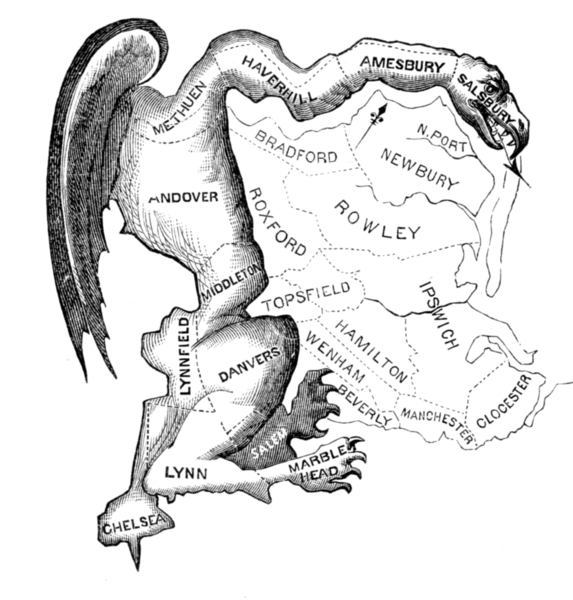 Note: Landmark Cases, C-SPAN’s series on historic Supreme Court decisions—produced in cooperation with the National Constitution Center—continues on Monday, December 7 at 9 p.m. ET with the story of Baker v. Carr.
Note: Landmark Cases, C-SPAN’s series on historic Supreme Court decisions—produced in cooperation with the National Constitution Center—continues on Monday, December 7 at 9 p.m. ET with the story of Baker v. Carr.
On Tuesday, December 8, the Supreme Court will hear arguments in one of the most controversial cases this term, Evenwel v. Abbott. The Court will be tasked with determining the meaning of the “one person, one vote” doctrine that was established in 1964 in Reynolds v. Sims.
Two years before Reynolds, however, the Supreme Court laid down the groundwork for that decision and other similar voting rights cases in Baker v. Carr. In Baker, the Supreme Court established the reigning precedent for what counts as a “political question.” The decision and the Court’s interpretation of the political question doctrine has greatly impacted constitutional law and voting rights over the past 50 years.
The political question doctrine limits the power of the judiciary by constraining the types of cases over which courts have jurisdiction and are thus able to render decisions. A “political question” has historically been understood as a case dealing with issues or powers that have been committed to another branch under the Constitution. The doctrine was articulated in Chief Justice John Marshall’s opinion in Marbury v. Madison (1803), in which he explained that the “province of the court is, solely, to decide on the rights of individuals … Questions in their nature political, or which are, by the constitution and laws, submitted to the executive can never be made in this court.”
In 1946, the Supreme Court decided in Colegrove v. Green that questions of congressional district apportionment were in fact political questions, and that the courts did not have the authority to hear disputes on the matter. Despite the fact that Illinois congressional districts seemed to violate notions of fair apportionment, and the equal protection of voting rights, Justice Felix Frankfurter wrote in the plurality opinion that “the remedy for unfairness in districting is to secure State legislatures that will apportion properly,” rather than to seek redress from the judiciary.
But in 1959, Shelby County resident Charles Baker filed suit against Tennessee Secretary of State Joseph Cordell Carr, alleging that the malapportionment of the state’s congressional districts violated the 14th Amendment guarantee to equal protection under the law. His case was motivated by the fact that Tennessee had not been redistricted since 1901, and that major demographical shifts had occurred since that time. Under the old apportionment scheme, rural voters were overrepresented; Baker thus alleged that the inequality of voting power throughout the state was unconstitutional.
Writing for a 6-2 majority, Justice William Brennan said that the judiciary did in fact have the authority to hear and decide the case, after formally articulating the guidelines for determining what amounts to a political question. Brennan laid out the characteristics of political questions, which included cases in which:
- The Court is asked to decide on issues that are committed by the Constitution’s text to another branch, like executive war powers.
- Any way the Court ruled would undermine the judiciary’s respect for separation of powers and the other branches.
- There exists no “judicially discoverable or manageable standards” for resolving the issue.
The majority opinion explained that, even in light of these constrains, the judiciary could rule on state apportionment schemes. The Court did not decide, however, what relief ought to be granted to Baker or what sort of apportionment should be approved in light of the 14th Amendment, but simply instructed lower courts to rehear the case.
Various concurring opinions highlighted differences in how the Justices assessed the political question doctrine and the power of the judiciary more broadly. Justice Tom Clark agreed that the Court could hear the case, but found it curious that the majority did not grant relief to Baker in light of that determination. Justice Potter Stewart, on the other hand, emphatically pointed out that the only issues the court ruled on were the political question doctrine and whether Baker had standing. He expressed skepticism that there was anything constitutionally suspect about Tennessee’s apportionment scheme.
Justice Frankfurter, perhaps not surprisingly in light of his decision in Colegrove, forcefully dissented and decried the Court’s assertion of “destructively novel judicial power.” He expressed his concern that this decision would erode the Court’s authority, which rests on “sustained public confidence in its moral sanction.” He wrote that the plaintiff should seek relief from the legislative branch, rather than the courts, and reaffirmed the decision he penned years earlier that was overturned by the majority.
With its decision in Baker, the Court granted itself the power to review legislative apportionment schemes, and began establishing rules for apportionment two years later in Reynolds. The Baker precedent has also been applied in cases dealing with different political questions, including Nixon v. United States, in which the Court ruled that it couldn’t decide on the details of impeachment proceedings because impeachment is a political question.
While some critics decry Baker v. Carr as an unreasonable power-grab by the Supreme Court, others praise the decision because it empowered the Court to protect voting rights in a more robust manner.
Jonathan Stahl is an intern at the National Constitution Center. He is also a senior at the University of Pennsylvania, majoring in politics, philosophy and economics.







